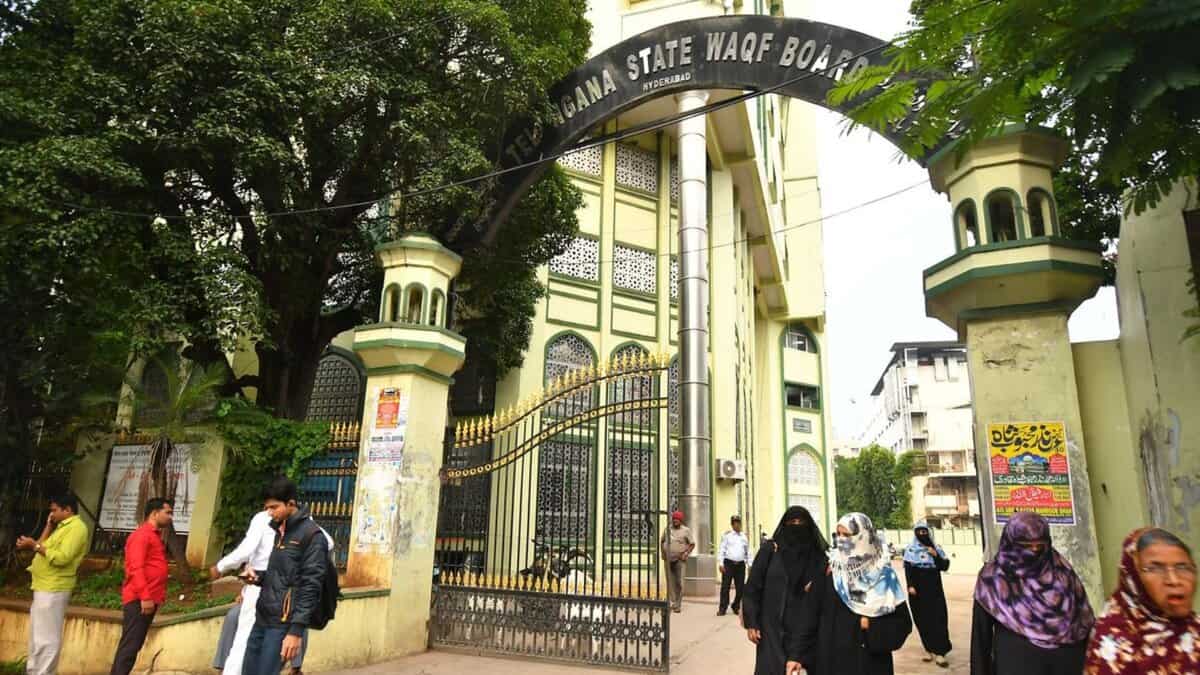
Hyderabad: On the final day of submitting applications at the Bhu Bharati revenue issues redressal programme, many petitioners were left in shock after they found out their land was being classified as Waqf land.
On Friday, May 16, many gathered to understand why their land was under the ‘prohibited list’ in the now-scrapped Dharani portal. However, to see their land under Waqf was not what many were expecting.
The mandal revenue officer (MRO), who was at the programme, asked them to approach the Telangana Waqf Board or proceed legally.
Double entries in revenue records
In 2003, a gazette notification on Waqf properties was issued. At that time, the Kondurg mandal, which includes Kondurg and Kondurg West, was treated as one.
Over time, survey numbers 75, 76 and 80 were duplicated in the revenue records as Kondurg and Kondurg West, which subsequently were listed as Waqf lands, thus disabling owners of these lands from selling.
When Siasat.com spoke to MRO Jagadeeshwar on how the revenue department intends to resolve the issues regarding Friday’s Bhu Bharati redressal programme, the officer said, “The department will conduct a field inquiry to verify the extent of these Waqf lands and if there are any discrepancies. Based on the survey, a proposal will be submitted to the revenue divisional officer (RDO), from where further course of action will be decided.”
Siasat.com has learnt that such issues were frequently reported when the Dharani portal was operational before it was scrapped by the Congress government. However, the newly launched Bhu Bharati has also failed to provide any clarity on how the state government intends to resolve the disputes involving the Waqf lands.
The situation has become even more complicated following the enactment of the Waqf (Amendment) Act, 2025, passed by the Centre on April 8 — a move that has further polarised public opinion around an already sensitive issue. Several Muslim bodies and opposition MPs have moved the Supreme Court against the law, which the ruling alliance has described as a force for transparency and empowerment of backward Muslims and women from the community. The opposition has slammed it as unconstitutional and claimed that it infringes on the rights of Muslims.
Status of Waqf lands in Telangana
To dig deeper, Siasat.com reached out to Dr Mohd Safiullah, who served as the deputy chief executive officer (CEO) of the Telangana Waqf board. “When I took over the office, I was told that I am the custodian of 77,538 acres of Waqf land in the state,” he says.
“After spending eight months scanning and verifying land records across Telangana, I found out that 55,000 acres of land were provided to the poor by the previous governments, leaving only 20,000 acres of Waqf lands currently with the state government,” he said.
He alleges that since the Act’s introduction in 1954, and the decades that followed, a large extent of Waqf lands have fallen into the hands of private individuals.
“For instance, about 513 acres of land outside the Adilabad town is recorded under Waqf. But there’s no documentation or clarity on how or when they were classified as such,” he said.
Dr Safiullah believes that such disputed classifications could affect tens of thousands of acres across Telangana.
Waqf Board still awaits compensation
Successive governments have not only failed to protect Telangana Waqf lands from being turned into private properties and vice versa, but they have also not compensated the Waqf Board for using its land for major infrastructure projects. This includes land taken for irrigation and road works.
Dr Safiullah gave the example of 1,100 acres of Waqf land at Baba Shareefuddin Pahadi that were taken by the then Congress government of undivided Andhra Pradesh to build the Rajiv Gandhi International Airport. In return, the Waqf Board received just 55 acres in Shamshabad and 35 acres in Koheda as compensation.
He added that as of 2021, the state government owed Rs 1,400 crore to the Waqf Board in compensation for various land acquisitions.
Speaking about the process of declaring land as Waqf property, Dr Safiullah explained that it is a long procedure. “A public notification is issued in newspapers, giving one year for people to file objections. Only after this can a survey be conducted by the survey commissioner of Waqf, followed by a final gazette notification,” he said.
Recent court judgments on Waqf lands
There have been several court judgments with regards to the Telangana Waqf lands. In 2022, the Supreme Court ruled that the 1,191 acres of land in Manikonda Jagir belonged to the then BRS government and the Telangana State Industrial Infrastructure Corporation (TGIIC).
This land was earlier claimed by the Waqf Board. During the course of the legal proceedings, it was found out that the Waqf board had tampered with a document of 4,800 square yards of land to 1,654 acres by using a whitener.
The pursuance of such a case was possible only because of the resources available with the revenue department.
On being asked if the district collector has any say on the claimants of these lands, Dr Safiullah said that it is only up to the courts to decide.
The changing political positioning on Waqf lands
There are also political implications and ramifications with regard to taking any decision or even touching the subject of Waqf lands in Telangana, if not across the country.
The Congress has vocally and in its actions in the Parliament, has made its stand very clear about the newly passed Waqf (Amendment) Act.
In Telangana, where the party enjoys a rapport with the All India Majlis-E-Ittehadul-Muslimeen (AIMIM), it needs to be seen if it can push for the process of reconciliation, which has been pending for decades.
The one party which certainly seems to be benefiting from all this is the Bharatiya Janata Party (BJP), whose leaders are raising the issue of Waqf land entries in the revenue records, and have been trying to woo the claimants who are spread across the state, that it was the only party which could do justice to them.
The next hearing on the Waqf (Amendment) Act is scheduled on May 20, 2025. Political observers feel that it is going to be a long-drawn-out legal issue. What needs to be seen is whether the Telangana government can work something out to reclaim the Waqf properties which have gone into the hands of private individuals, at the same time taking steps to help the genuine claimants whose lands may have, for some reason, been shown in the revenue records as Waqf lands. It is certainly a tightrope to walk on.




